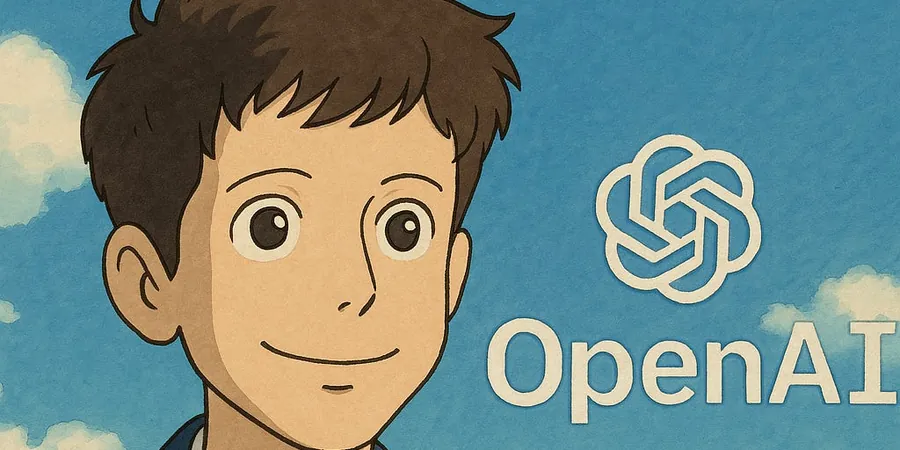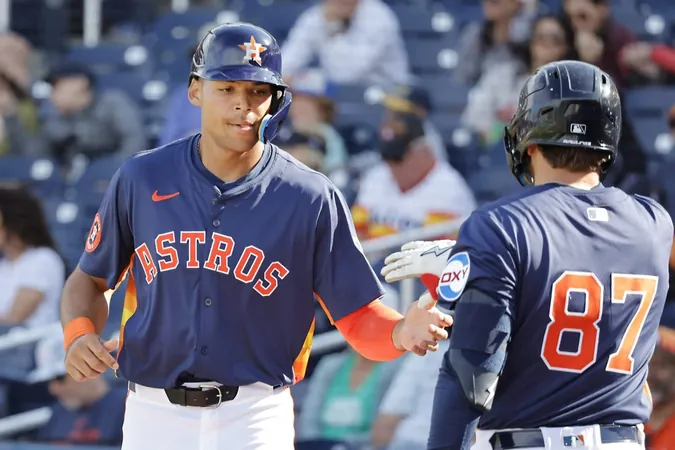
OpenAI's Ghibli Craze Spirals Into Controversy: A Cautionary Tale for AI Art
2025-03-28
Author: Ken Lee
OpenAI's recent launch of its new image generator, "Images for ChatGPT," sparked both excitement and urgency within the online community, quickly evolving into a whirlwind of creativity and controversy.
The drama began shortly after the tool's unveiling when a user on X (formerly Twitter) highlighted a curious inconsistency: the tool generated images of a "sexy man" but refused to create corresponding "sexy women." This issue sparked a response from OpenAI's CEO, Sam Altman, who attributed the problem to a "bug" and assured users that a fix was on the way.
In a wave of enthusiasm, users quickly began to flood X with Ghibli-style reimaginings of everything from their own images to beloved memes and even public figures, including former President Donald Trump. The excitement reached new heights when Altman himself joined the trend, updating his profile picture to a Ghibli-themed version of himself. Even the White House's official account contributed by sharing a Ghibli-tinted photo of a woman apprehended by ICE.
The Downward Spiral Into Controversy
However, what began as a playful exploration of Studio Ghibli’s iconic animation style took a sharp downturn when users began producing Ghibli-inspired images depicting historical tragedies, including JFK's assassination and the September 11 attacks, raising serious ethical questions.
In response, OpenAI announced on Wednesday that it would start blocking requests for Ghibli-style images and advised users that it would adopt a "conservative approach" in refusing requests for likenesses of living artists. Yet savvy users discovered methods around these limitations. Attempts using the paid version of the tool still allowed for various Ghibli-style images, proving that OpenAI's efforts to control the demand were only partially effective.
In light of the growing backlash, OpenAI significantly restricted the number of images users could generate via its free version, which ultimately ceased to accept image requests altogether, citing copyright regulations.
A Storm Over Copyrights
Aside from the technical troubles, OpenAI is facing a burgeoning debate regarding the legitimacy of the tool's usage of artistic styles. Critics argue that the Ghibli-fying trend disregards the immense dedication of artists like Hayao Miyazaki, whose imaginative films such as "Spirited Away" and "My Neighbor Totoro" are celebrated for their handcrafted beauty.
Ed Newton-Rex, the CEO of Fairly Trained, a nonprofit organization that advocates for ethical AI practices, called the situation a "takeoff moment for AI protests." He pointed out that this incident resonates strongly with previous controversies, such as the Scarlett Johansson case, when the actress threatened legal action against OpenAI for an AI voice model that mimicked her voice too closely.
The growing tide of discontent over OpenAI's potential intellectual property infringements raises questions about whether “Ghibli-gate” will join a lengthy list of legal challenges the company faces due to similar allegations from various artists, authors, and media organizations.
Newton-Rex emphasized on X that "obvious and egregious IP theft by AI companies has united authors and artists in outrage," hinting that public protests may escalate as more creators find themselves affected by AI applications.
The increasing tension surrounding this tool also stirs concern for professionals in graphic design and startups focused on AI-generated imagery. Klarna’s CEO, Sebastian Siemiatkowski, expressed his dismay in an X post, highlighting that OpenAI's endeavor has already "wiped out" several companies and holds "serious implications for countless jobs."
As the discussion unfolds, it’s clear that the intersection of art and artificial intelligence presents new challenges, urging society to grapple with ethical considerations as technology continues to evolve rapidly.

 Brasil (PT)
Brasil (PT)
 Canada (EN)
Canada (EN)
 Chile (ES)
Chile (ES)
 Česko (CS)
Česko (CS)
 대한민국 (KO)
대한민국 (KO)
 España (ES)
España (ES)
 France (FR)
France (FR)
 Hong Kong (EN)
Hong Kong (EN)
 Italia (IT)
Italia (IT)
 日本 (JA)
日本 (JA)
 Magyarország (HU)
Magyarország (HU)
 Norge (NO)
Norge (NO)
 Polska (PL)
Polska (PL)
 Schweiz (DE)
Schweiz (DE)
 Singapore (EN)
Singapore (EN)
 Sverige (SV)
Sverige (SV)
 Suomi (FI)
Suomi (FI)
 Türkiye (TR)
Türkiye (TR)
 الإمارات العربية المتحدة (AR)
الإمارات العربية المتحدة (AR)